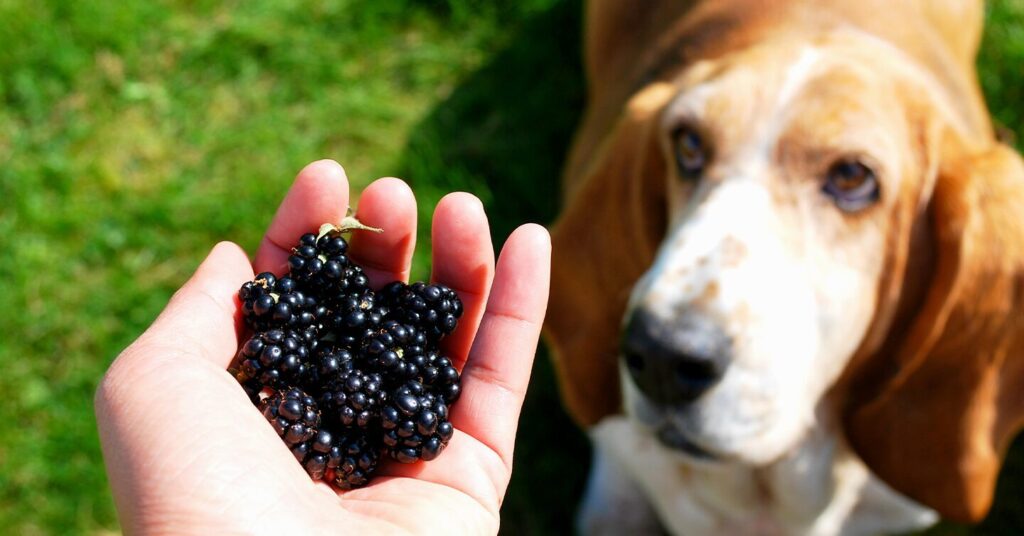Key Points:
- Yes, dogs can eat blackberries in moderation as a healthy treat.
- Blackberries provide dogs with fiber, vitamins C, and K, and antioxidants.
- In large quantities, blackberries can cause digestive upset in dogs.
Here’s a juicy question: Can dogs eat blackberries? If you’re like most dog owners, you may have wondered at one point which fruits and veggies are safe for your pet.
Before you decide to chance it and toss your pup a new food, it’s always best to do your research. Some common foods like grapes and onions can be very toxic to dogs. Fortunately for berry lovers, these fruits are generally safe and nutritious for humans and dogs alike.
Dogs can eat blackberries when served plain and in healthy amounts. They’re nutrient-packed treats that can add a burst of color and flavor to your dog’s diet.
The nutritional value of blackberries
Blackberries are not only tasty but also pack a vitamin-heavy punch. Just check out the nutritional content:
- High fiber content
- Low in sugar
- Omega-3 fatty acids
- Vitamin D
- Vitamin C
- Vitamin E
- Vitamin K
- Calcium
- Iron
- Potassium
- Rich in antioxidants
Blackberries’ low sugar content compared to other fruits makes them an ideal snack for all dogs, especially those that need weight management.
Health benefits of blackberries
Blackberries are small fruits with big benefits for our pups. Here are some of the top benefits of blackberries for dogs.
Immunity boost
Blackberries contain the essential vitamins A, C, and K, which support immune function. These vitamins also improve coat health, blood clotting, and brain function.
Healthy teeth and bones
Vitamin K in particular supports bone and tooth health, making blackberries ideal snacks for elderly dogs.
A shinier coat
Omega-3 fatty acids promote a shiny coat by moisturizing the skin and reducing shedding. They also reduce dry, itchy skin and dandruff in dogs.
Help with inflammation
Anthocyanins are water-soluble pigments that give blackberries their distinct black-purplish color. They are known for reducing inflammation by inhibiting pro-inflammatory cytokines.
Less constipation
Blackberries are naturally high in fiber, which helps prevent constipation and aids digestion. Fiber also induces a feeling of fullness and can help curb overeating.

Risks of feeding blackberries to dogs
While blackberries are generally a safe treat for our pets, they come with a few minor health hazards. Here’s what you need to know:
Choking hazard
Though small in size, blackberries can pose a choking hazard, especially to small pets. Their size and shape can be challenging for tiny breeds to chew and swallow. While you might not normally chop up blackberries, consider doing this for smaller pooches.
Toxic substances
Though blackberries themselves contain no artificial substances, processed blackberry products, like blackberry jam, may contain xylitol. Xylitol is an artificial sweetener that is incredibly toxic to dogs and must be avoided.
Allergic reactions
Some dogs may have allergies or sensitivities to eating blackberries. They may experience symptoms such as:
- Itchiness
- Swelling
- Digestive upset
- Diarrhea
- Excessive gas
The key to avoiding bad reactions is to introduce blackberries to your dog’s diet slowly, one berry at a time. Monitor your dog for any allergic reactions that develop after their initial consumption.
Can puppies eat blackberries?
Blackberries are generally safe for puppies, too. However, puppies have smaller stomachs and consequently may have more serious reactions if blackberries don’t agree with them.
You can start with a small portion and observe how your puppy reacts. If they’re fine with blackberries, you can cut up the berries or mash them before feeding them.
Pet Pro Tip: If you have a dog that is prone to ‘snacksidents’ – you should consider getting a dog insurance plan as soon as possible. It can help you afford the best care in the future by covering eligible vet bills for digestive illnesses, toxic ingestion, and more.
How to prepare blackberries for dogs
You can serve washed blackberries smashed, diced, frozen, or puréed in your dog’s bowl, so long as there are no additional ingredients like sugar or spices.
Mix blackberries into smoothies with other fresh, healthy fruits that are safe for dogs to eat — like peaches, mangoes, strawberries, or bananas.
Avoid sharing human foods containing blackberries like pies or cobblers. They usually contain high amounts of sugar, artificial sweeteners, or seasonings that may cause indigestion.
How to prepare wild blackberries for your dog
If you happen upon a wild blackberry bush during one of your walks with your dog, you can pick fresh blackberries off the bush to feed to your pet. Simply remove any twigs, leaves, or dirt from the berries. As with all fruits, you should wash them before sharing them with your dog.

If there’s clean water nearby or if you carry a water jug with you, wash the wild blackberries to remove dirt. Then you can break them into small pieces to give to your dog.
How many blackberries can my dog eat?
Small dogs can have a few berries, and large dogs may eat a handful with no side effects. The best advice is to follow the 10/90% treat rule — 90% of your dog’s diet should be their regular dog food, and 10% can come from treats.
Always start with just one blackberry to see how your dog reacts, and watch for any signs of stomach upset.
Tip: Blackberries carry a trace amount of xylitol, a natural occurring sweetener found in fruits and vegetables. Your dog would have to eat a lot of blackberries to ingest a toxic amount, but in the event you come home to a whole carton of blackberries gobbled up, watch for excessive diarrhea or vomiting, blood in their poop, seizures, weakness or loss of coordination, and collapse. Call your vet immediately if your dog displays any of these symptoms.
What berries are toxic to dogs?
While most types of berries are safe for dogs, there are a few exceptions. It’s a good rule of thumb to avoid wild berries you can’t identify, especially if you’re in unknown territory.
Never feed your dogs the following berries:
- Holly berries
- Winterberries
- Poke berries
- Dogwood berries
- Juniper berries
- Mistletoe berries
While not all berries pose health hazards, it’s best to err on the side of caution with unknown fruits.
Healthy alternatives to blackberries your dog can enjoy
Lots of parents complain that their household blackberry budget is out of control. And if you’ve got hungry kids and pets chowing down on blackberries, these healthy treats can get expensive, and fast. Here are some healthy alternatives to blackberries that you can also give your pets (and any blackberry-obsessed toddlers in the house):
- Blueberries
- Raspberries
- Pumpkins
- Sweet potatoes
- Carrots
- Apples
- Bananas
Berries, many other fruits, and most veggies are generally healthy for both humans and animals, as long as they are consumed in moderation. Make sure to also remove seeds, fruit cores, and stems before feeding them to your pet.
The verdict: Blackberries are safe snacks

Bursting with vitamins and antioxidants, blackberries offer many benefits to dogs including better digestion, stronger immunity, improved heart health, and stronger bones.
Just remember to prepare them safely and watch for bad reactions during your pet’s first taste. As always, it never hurts to talk to your veterinarian before offering your dog any new food.
Every dog is unique. While many human foods are generally safe for dogs, there’s no certainty that one pet will tolerate them as well as another. When unexpected accidents or illnesses arise in the future, a Pumpkin Pet Insurance plan can help you afford the vet care they need without too much strain on your wallet.
FAQs
-
- https://www.pubs.ext.vt.edu/SPES/spes-366/spes-366.html
- https://www.iams.com/dog/dog-articles/what-nutrients-does-your-dog-need-their-skin-and-coat-health
- https://www.ncbi.nlm.nih.gov/pmc/articles/PMC6955144/
- https://www.akc.org/expert-advice/nutrition/fish-oil-for-dogs/
- https://www.sciencedirect.com/science/article/abs/pii/S0889157516300072
- https://www.farmersalmanac.com/identify-common-wild-berries
- https://www.pubs.ext.vt.edu/SPES/spes-366/spes-366.html[2]
DISCLOSURE




